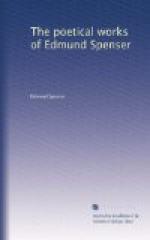“I hate all men, and shun all womankinde;
The one, because as I they wretched are;
The other, for because I doo not finde
My love with them, that wont to be their starre.
And life I hate, because it will not last;
425
And death I hate, because it life doth marre;
And all I hate that is to come or past.
“So all the world, and all in it I hate,
Because it changeth ever to and fro,
And never standeth in one certaine state,
430
But, still unstedfast, round about doth goe
Like a mill-wheele in midst of miserie,
Driven with streames of wretchednesse and woe,
That dying lives, and living still does dye.
“So doo I live, so doo I daylie die,
435
And pine away in selfe-consuming paine!
Sith she that did my vitall powres supplie,
And feeble spirits in their force maintaine,
Is fetcht fro me, why seeke I to prolong
My wearie daies in dolour and disdalne!
440
Weepe, Shepheard! weepe, to make my undersong.
IV.
“Why doo I longer live in lifes despight,
And doo not dye then in despight of death!
Why doo I longer see this loathsome light,
And doo in darknesse not abridge my breath,
445
Sith all my sorrow should have end thereby,
And cares finde quiet! Is it so uneath*
To leave this life, or dolorous to dye?
[* Uneath, difficult.]
“To live I finde it deadly dolorous,
For life drawes care, and care continuall woe;
450
Therefore to dye must needes be ioyeous,
And wishfull thing this sad life to forgoe.
But I must stay; I may it not amend;
My Daphne hence departing bad me so;
She bad me stay, till she for me did send.
455
“Yet, whilest I in this wretched vale doo stay,
My wearie feete shall ever wandring be,
That still I may be readie on my way
When, as her messenger doth come for me;
Ne will I rest my feete for feeblenesse,
460
Ne will I rest my limmes for frailtie,
Ne will I rest mine eyes for heavinesse.
“But, as the mother of the gods, that sought
For faire Euridyce, her daughter dere,
Throughout the world, with wofull heavie thought,
So will I travell whilest I tarrie heere,
466
Ne will I lodge, ne will I ever lin*,
Ne, when as drouping Titan draweth nere
To loose his teeme, will I take up my inne**.
[* Lin, cease.]
[** Inne, lodging.]
“Ne sleepe, the harbenger* of wearie wights,
470
Shall ever lodge upon mine eye-lids more,
Ne shall with rest refresh my fainting sprights,
Nor failing force to former strength restore:
But I will wake and sorrow all the night
With Philumene*, my fortune to deplore;
475
With Philumene, the partner of my plight.
[* Harbenger, one who provides
lodging or repose.]
[** Philumene, Philomel.]




